#Claire Cameron
Text
Greenwashing set Canada on fire
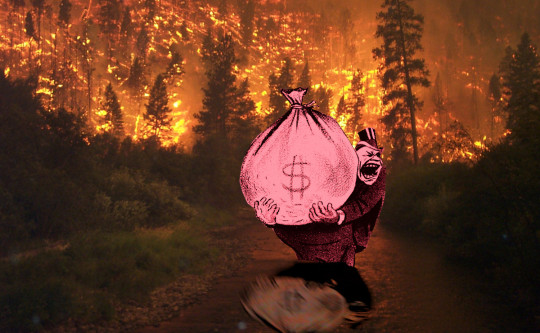
On September 22, I'm (virtually) presenting at the DIG Festival in Modena, Italy. On September 27, I'll be at Chevalier's Books in Los Angeles with Brian Merchant for a joint launch for my new book The Internet Con and his new book, Blood in the Machine.

As a teenager growing up in Ontario, I always envied the kids who spent their summers tree planting; they'd come back from the bush in September, insect-chewed and leathery, with new muscle, incredible stories, thousands of dollars, and a glow imparted by the knowledge that they'd made a new forest with their own blistered hands.
I was too unathletic to follow them into the bush, but I spent my summers doing my bit, ringing doorbells for Greenpeace to get my neighbours fired up about the Canadian pulp-and-paper industry, which wasn't merely clear-cutting our old-growth forests – it was also poisoning the Great Lakes system with PCBs, threatening us all.
At the time, I thought of tree-planting as a small victory – sure, our homegrown, rapacious, extractive industry was able to pollute with impunity, but at least the government had reined them in on forests, forcing them to pay my pals to spend their summers replacing the forests they'd fed into their mills.
I was wrong. Last summer's Canadian wildfires blanketed the whole east coast and midwest in choking smoke as millions of trees burned and millions of tons of CO2 were sent into the atmosphere. Those wildfires weren't just an effect of the climate emergency: they were made far worse by all those trees planted by my pals in the eighties and nineties.
Writing in the New York Times, novelist Claire Cameron describes her own teen years working in the bush, planting row after row of black spruces, precisely spaced at six-foot intervals:
https://www.nytimes.com/2023/09/15/opinion/wildfires-treeplanting-timebomb.html
Cameron's summer job was funded by the logging industry, whose self-pegulated, self-assigned "penalty" for clearcutting diverse forests of spruce, pine and aspen was to pay teenagers to create a tree farm, at nine cents per sapling (minus camp costs).
Black spruces are made to burn, filled with flammable sap and equipped with resin-filled cones that rely on fire, only opening and dropping seeds when they're heated. They're so flammable that firefighters call them "gas on a stick."
Cameron and her friends planted under brutal conditions: working long hours in blowlamp heat and dripping wet bulb humidity, amidst clouds of stinging insects, fingers blistered and muscles aching. But when they hit rock bottom and were ready to quit, they'd encourage one another with a rallying cry: "Let's go make a forest!"
Planting neat rows of black spruces was great for the logging industry: the even spacing guaranteed that when the trees matured, they could be easily reaped, with ample space between each near-identical tree for massive shears to operate. But that same monocropped, evenly spaced "forest" was also optimized to burn.
It burned.
The climate emergency's frequent droughts turn black spruces into "something closer to a blowtorch." The "pines in lines" approach to reforesting was an act of sabotage, not remediation. Black spruces are thirsty, and they absorb the water that moss needs to thrive, producing "kindling in the place of fire retardant."
Cameron's column concludes with this heartbreaking line: "Now when I think of that summer, I don’t think that I was planting trees at all. I was planting thousands of blowtorches a day."
The logging industry committed a triple crime. First, they stole our old-growth forests. Next, they (literally) planted a time-bomb across Ontario's north. Finally, they stole the idealism of people who genuinely cared about the environment. They taught a generation that resistance is futile, that anything you do to make a better future is a scam, and you're a sucker for falling for it. They planted nihilism with every tree.
That scam never ended. Today, we're sold carbon offsets, a modern Papal indulgence. We are told that if we pay the finance sector, they can absolve us for our climate sins. Carbon offsets are a scam, a market for lemons. The "offset" you buy might be a generated by a fake charity like the Nature Conservancy, who use well-intentioned donations to buy up wildlife reserves that can't be logged, which are then converted into carbon credits by promising not to log them:
https://pluralistic.net/2020/12/12/fairy-use-tale/#greenwashing
The credit-card company that promises to plant trees every time you use your card? They combine false promises, deceptive advertising, and legal threats against critics to convince you that you're saving the planet by shopping:
https://pluralistic.net/2021/11/17/do-well-do-good-do-nothing/#greenwashing
The carbon offset world is full of scams. The carbon offset that made the thing you bought into a "net zero" product? It might be a forest that already burned:
https://pluralistic.net/2022/03/11/a-market-for-flaming-lemons/#money-for-nothing
The only reason we have carbon offsets is that market cultists have spent forty years convincing us that actual regulation is impossible. In the neoliberal learned helplessness mind-palace, there's no way to simply say, "You may not log old-growth forests." Rather, we have to say, "We will 'align your incentives' by making you replace those forests."
The Climate Ad Project's "Murder Offsets" video deftly punctures this bubble. In it, a detective points his finger at the man who committed the locked-room murder in the isolated mansion. The murderer cheerfully admits that he did it, but produces a "murder offset," which allowed him to pay someone else not to commit a murder, using market-based price-discovery mechanisms to put a dollar-figure on the true worth of a murder, which he duly paid, making his kill absolutely fine:
https://pluralistic.net/2021/04/14/for-sale-green-indulgences/#killer-analogy
What's the alternative to murder offsets/carbon credits? We could ask our expert regulators to decide which carbon intensive activities are necessary and which ones aren't, and ban the unnecessary ones. We could ask those regulators to devise remediation programs that actually work. After all, there are plenty of forests that have already been clearcut, plenty that have burned. It would be nice to know how we can plant new forests there that aren't "thousands of blowtorches."
If that sounds implausible to you, then you've gotten trapped in the neoliberal mind-palace.
The term "regulatory capture" was popularized by far-right Chicago School economists who were promoting "public choice theory." In their telling, regulatory capture is inevitable, because companies will spend whatever it takes to get the government to pass laws making what they do legal, and making competing with them into a crime:
https://pluralistic.net/2022/06/13/public-choice/#ajit-pai-still-terrible
This is true, as far as it goes. Capitalists hate capitalism, and if an "entrepreneur" can make it illegal to compete with him, he will. But while this is a reasonable starting-point, the place that Public Choice Theory weirdos get to next is bonkers. They say that since corporations will always seek to capture their regulators, we should abolish regulators.
They say that it's impossible for good regulations to exist, and therefore the only regulation that is even possible is to let businesses do whatever they want and wait for the invisible hand to sweep away the bad companies. Rather than creating hand-washing rules for restaurant kitchens, we should let restaurateurs decide whether it's economically rational to make us shit ourselves to death. The ones that choose poorly will get bad online reviews and people will "vote with their dollars" for the good restaurants.
And if the online review site decides to sell "reputation management" to restaurants that get bad reviews? Well, soon the public will learn that the review site can't be trusted and they'll take their business elsewhere. No regulation needed! Unleash the innovators! Set the job-creators free!
This is the Ur-nihilism from which all the other nihilism springs. It contends that the regulations we have – the ones that keep our buildings from falling down on our heads, that keep our groceries from poisoning us, that keep our cars from exploding on impact – are either illusory, or perhaps the forgotten art of a lost civilization. Making good regulations is like embalming Pharaohs, something the ancients practiced in mist-shrouded, unrecoverable antiquity – and that may not have happened at all.
Regulation is corruptible, but it need not be corrupt. Regulation, like science, is a process of neutrally adjudicated, adversarial peer-review. In a robust regulatory process, multiple parties respond to a fact-intensive question – "what alloys and other properties make a reinforced steel joist structurally sound?" – with a mix of robust evidence and self-serving bullshit and then proceed to sort the two by pantsing each other, pointing out one another's lies.
The regulator, an independent expert with no conflicts of interest, sorts through the claims and counterclaims and makes a rule, showing their workings and leaving the door open to revisiting the rule based on new evidence or challenges to the evidence presented.
But when an industry becomes concentrated, it becomes unregulatable. 100 small and medium-sized companies will squabble. They'll struggle to come up with a common lie. There will always be defectors in their midst. Their conduct will be legible to external experts, who will be able to spot the self-serving BS.
But let that industry dwindle to a handful of giant companies, let them shrink to a number that will fit around a boardroom table, and they will sit down at a table and agree on a cozy arrangement that fucks us all over to their benefit. They will become so inbred that the only people who understand how they work will be their own insiders, and so top regulators will be drawn from their own number and be hopelessly conflicted.
When the corporate sector takes over, regulatory capture is inevitable. But corporate takeover isn't inevitable. We can – and have, and will again – fight corporate power, with antitrust law, with unions, and with consumer rights groups. Knowing things is possible. It simply requires that we keep the entities that profit by our confusion poor and thus weak.
The thing is, corporations don't always lie about regulations. Take the fight over working encryption, which – once again – the UK government is trying to ban:
https://www.theguardian.com/technology/2023/feb/24/signal-app-warns-it-will-quit-uk-if-law-weakens-end-to-end-encryption
Advocates for criminalising working encryption insist that the claims that this is impossible are the same kind of self-serving nonsense as claims that banning clearcutting of old-growth forests is impossible:
https://twitter.com/JimBethell/status/1699339739042599276
They say that when technologists say, "We can't make an encryption system that keeps bad guys out but lets good guys in," that they are being lazy and unimaginative. "I have faith in you geeks," they said. "Go nerd harder! You'll figure it out."
Google and Apple and Meta say that selectively breakable encryption is impossible. But they also claim that a bunch of eminently possible things are impossible. Apple claims that it's impossible to have a secure device where you get to decide which software you want to use and where publishers aren't deprive of 30 cents on every dollar you spend. Google says it's impossible to search the web without being comprehensively, nonconsensually spied upon from asshole to appetite. Meta insists that it's impossible to have digital social relationship without having your friendships surveilled and commodified.
While they're not lying about encryption, they are lying about these other things, and sorting out the lies from the truth is the job of regulators, but that job is nearly impossible thanks to the fact that everyone who runs a large online service tells the same lies – and the regulators themselves are alumni of the industry's upper eschelons.
Logging companies know a lot about forests. When we ask, "What is the best way to remediate our forests," the companies may well have useful things to say. But those useful things will be mixed with actively harmful lies. The carefully cultivated incompetence of our regulators means that they can't tell the difference.
Conspiratorialism is characterized as a problem of what people believe, but the true roots of conspiracy belief isn't what we believe, it's how we decide what to believe. It's not beliefs, it's epistemology.
Because most of us aren't qualified to sort good reforesting programs from bad ones. And even if we are, we're probably not also well-versed enough in cryptography to sort credible claims about encryption from wishful thinking. And even if we're capable of making that determination, we're not experts in food hygiene or structural engineering.
Daily life in the 21st century means resolving a thousand life-or-death technical questions every day. Our regulators – corrupted by literally out-of-control corporations – are no longer reliable sources of ground truth on these questions. The resulting epistemological chaos is a cancer that gnaws away at our resolve to do anything about it. It is a festering pool where nihilism outbreaks are incubated.
The liberal response to conspiratorialism is mockery. In her new book Doppelganger, Naomi Klein tells of how right-wing surveillance fearmongering about QR-code "vaccine passports" was dismissed with a glib, "Wait until they hear about cellphones!"
https://pluralistic.net/2023/09/05/not-that-naomi/#if-the-naomi-be-klein-youre-doing-just-fine
But as Klein points out, it's not good that our cellphones invade our privacy in the way that right-wing conspiracists thought that vaccine passports might. The nihilism of liberalism – which insists that things can't be changed except through market "solutions" – leads us to despair.
By contrast, leftism – a muscular belief in democratic, publicly run planning and action – offers a tonic to nihilism. We don't have to let logging companies decide whether a forest can be cut, or what should be planted when it is. We can have nice things. The art of finding out what's true or prudent didn't die with the Reagan Revolution (or the discount Canadian version, the Mulroney Malaise). The truth is knowable. Doing stuff is possible. Things don't have to be on fire.

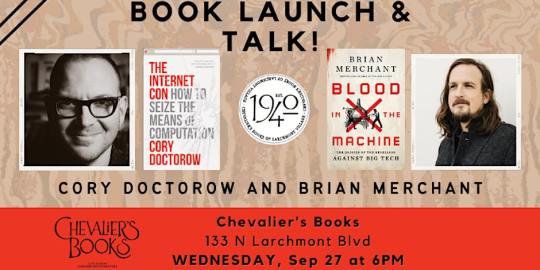

If you'd like an essay-formatted version of this post to read or share, here's a link to it on pluralistic.net, my surveillance-free, ad-free, tracker-free blog:
https://pluralistic.net/2023/09/16/murder-offsets/#pulped-and-papered
#pluralistic#logging#pulp and paper#ontario#greenwashing#a market for lemons#incentives matter#capitalism#late-stage capitalism#climate emergency#wildfires#canada#canpoli#ontpoli#carbon offsets#self-regulation#nerd harder#epistemological chaos#regulatory capture#Claire Cameron#pines in lines
3K notes
·
View notes
Text

Title: The Last Neanderthal | Author: Claire Cameron | Publisher: Little, Brown and Company (2017)
2 notes
·
View notes
Text
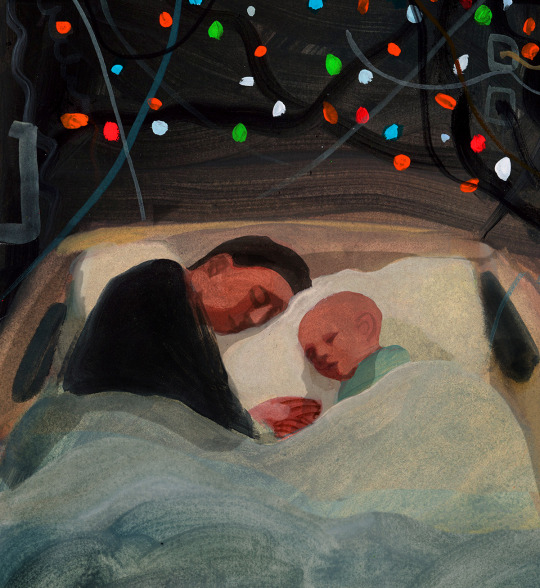
Jude the Brave
Everything looked the same as the year before—the rows of brick, a tree with lights, an inflatable Santa. Nothing was
Maybe Jude didn’t understand the idea of time folding because time had lost all meaning. A year, a month, a day—he started measuring moments instead. They bought a string of holiday lights. The only ones left in the store by then came with separate bulbs, but Noel enjoyed twisting in each light. Once hung, they helped him sleep. He was scared of the dark.
Read more at thewalrus.ca.
Illustration by Sydney Smith (sydneydraws.ca)
4 notes
·
View notes
Text
La última neandertal de Claire Cameron
Inaguramos julio con esta hermosa historia humana que sucede hace 40 mil años. No suelo leer traducciones, pero encontré este libro en el Museo Arqueológico Nacional en Madrid y no pude resistirme.
Lo más logrado de la novela es como la autora logra intercalar la vida de Chica, nuestra protagonista neandertal, con la vida de Rose, la arqueóloga que descubre sus restos. La narración va en dos…
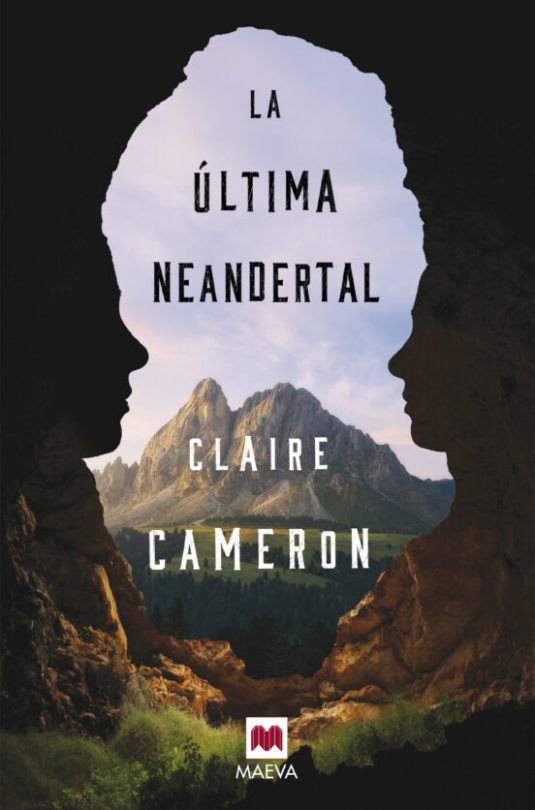
View On WordPress
0 notes
Text

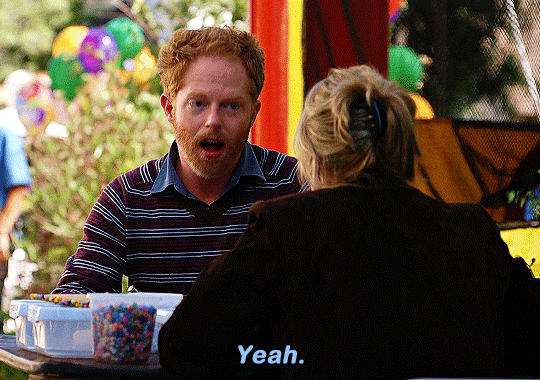
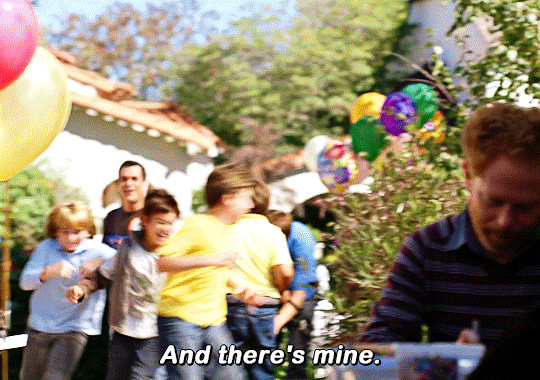
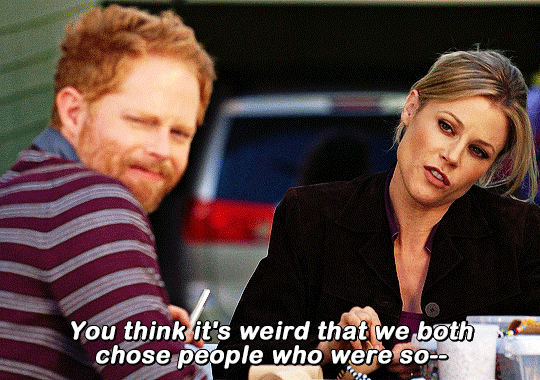



MODERN FAMILY (2009–2020)
S01E09: Fizbo
#modern family#modernfamilyedit#tvedit#claire dunphy#phil dunphy#mitchell pritchett#cameron tucker#cinematv#dailyflicks#userrobin#usersugar#userdiana#userteri#usermandie#useralison#userauden#userhella#ours: gifs#*#anja
2K notes
·
View notes
Text
words were being said.
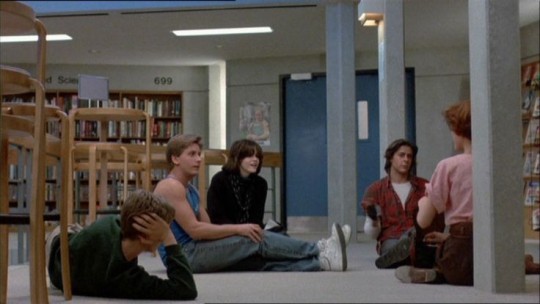
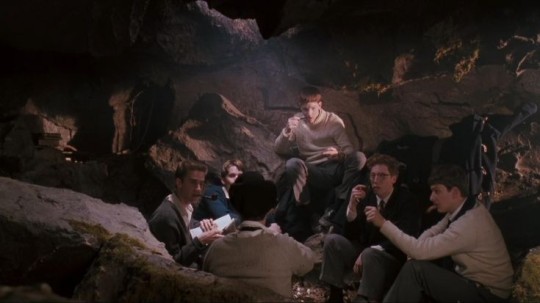
#the breakfast club#dead poets society#dead poets#1980s cinema#stephen meeks#neil perry#todd anderson#gerard pitts#charlie dalton#knox overstreet#richard cameron#john bender#allison reynolds#brian johnson#claire standish#andrew clark
1K notes
·
View notes
Text
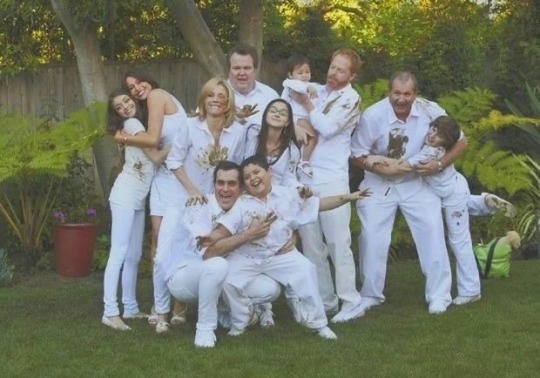
yes your honor this is my family
#modern family#ty burrell#sitcoms#gloria pritchett#jay pritchett#alex dunphy#haley dunphy#cameron tucker#mitchell pritchett#claire dunphy#luke dunphy
134 notes
·
View notes
Text
Yk what I want? I want to be able to sit on a couch and explain to a cameraman why I did what I just did. Like in the office and modern family.
Maybe even look at the camera while doing it
#the office us#the office#michael scott#jim halpert#pam beasley#dwight schrute#modern family#phil dunphy#claire dunphy#haley dunphy#alex dunphy#luke dunphy#jay pritchett#gloria pritchett#manny delgado#mitchell pritchett#cameron tucker
74 notes
·
View notes
Text
One thing i love about modern family is that all of the characters are so unhinged. Like, there's not one person in this show who's not clinically insane
#modern family#phil dunphy#claire dunphy#luke dunphy#haley dunphy#alex dunphy#jay pritchett#gloria pritchett#manny delgado#joe pritchett#mitchell pritchett#cameron tucker#lily tucker pritchett#pepper saltzman
970 notes
·
View notes
Text
“Why is this so hard? We’ve done this like seven times already today.”

“It’s hard because not everybody gets to have what we have.”
#modern family#phil dunphy#claire dunphy#haley dunphy#alex dunphy#luke dunphy#gloria pritchett#gloria delgado pritchett#manny delgado#joe pritchett#jay pritchett#mitchell pritchett#cameron tucker#lily tucker pritchett#[not my gif]
21 notes
·
View notes
Text
Modern family takes as a person with family issues (LOTS OF THEM)
I wish Sofia and Jay didn't have a baby or they had a daughter. Joe was the boy Jay always wanted and it will constantly make Mitchell and Manny feel less than
I wish we saw more Dunphy sibling episodes
Also more cousin moments. They didn't know what to do with the kids by the end. But I would love a bonding moment between them with Manny and Joe (technically not cousins) but that would have been nice
The whole Manny has a crush on Haley, Lily has a crush on Manny, Phil has a crush on Gloria and Joe like Claire is so weird. I don't know who came up with these jokes. But it was fucking gross.
Alex and Mitchell deserve all the hugs.
Older Lily was so neglected which makes no sense. Because Mitchell and Cam loved kid Lily so much and were great parents The writers really screwed up their dynamic
The adult relationships were more fleshed out than the kids .It makes sense that they did that but I would love to see Mitchell-Manny, Gloria-lily, Lily-Jay, Alex-Gloria, Luke-Cam, Luke-Mitchell, Claire-Manny ( like the scene in season 1 where they have that cute moment), Haley-Manny (not creepy ver), Luke-Lily, Manny- Alex and so many more
Haley's ending will always hurt me. Not because of Dylan but more because she was supposed to show all of us that she was more than just that high school cliche. I would love to see her a single stay-at-home mom or even a wife who wanted kids. But getting pregnant on accident and getting the future that everyone made fun of her assumed she would hurt me so much. (this could be because I spent my whole life fighting against what my parents wanted for me)
Cam is toxic but Mitchell as much as I love him can be condescending. So it makes sense Cam has to act the way he does for Mitch to see what he needs (DOESN'T MAKE IT OKAY BUT MAKES SENSE)
I really wished they didn't fuck Manny up as a character. He had so much potential
#modern family#phil dunphy#claire dunphy#haley dunphy#alex dunphy#luke dunphy#mitchell pritchett#gloria pritchett#manny delgado#cameron tucker#jay pritchett#lily pritchett-tucker#joe pritchett#sitcom#opinions#modern family opinions
33 notes
·
View notes
Text
The most heartbreaking and painful thing in the world? It's ending Modern Family.
#modern family#phil dunphy#claire dunphy#alex dunphy#luke dunphy#gloria pritchett#jay pritchett#mitchell pritchett#cameron tucker#haley dunphy#manny
47 notes
·
View notes
Text

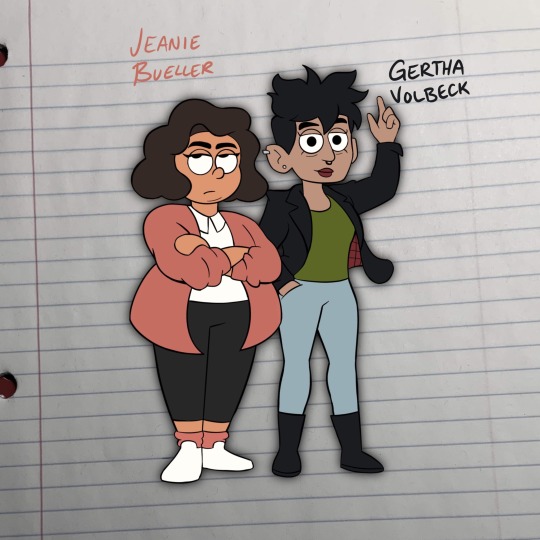

I always thought a “Ferris Bueller Meets the Breakfast Club” type story would be really fun.
I like to think that Ferris is friends with each member(Brian teaching him how to hack into the school attendance records on his computer; he, Sloane, and Claire talking about the hottest boys in the hallway; he and Cameron sitting with Allison every day for lunch etc)
#rjrogelart#ferris bueller's day off#ferris beuller#cameron frye#sloane peterson#brian johnson#allison reynolds#claire standish#andrew clark#the breakfast club#breakfast club#jeanie bueller#Garth volbeck#gertha volbeck#character design#cartoon#80s
89 notes
·
View notes
Text
Gay people from the 80s>>>


#dead poets society#the breakfast club#dps#anderperry#neil perry#dead poets#todd anderson#stephen meeks#richard cameron#charlie dalton#gerard pitts#allison reynolds#claire standish#brian johnson#andrew clark
367 notes
·
View notes
Text
It will eternally be so funny to me that Meyers accidentally created ACTUAL pack dynamics in nature with the renegade pack. Like the alpha/beta bullshit has been debunked long time back. Real wolfpacks aren't like that. Packs are just synonyms for family. There's a wolf dad and a wolf mum and their babies. There can even be gay wolf couples and their adopted babies (I mean what was the whole Sam-Jacob fight thing in breaking dawn if not a giant wolf divorce lol)! And what does the renegade pack have?
A wolf dad - Jacob. A wolf mom - Leah. A wolf baby - Seth.
Yes, yes I know technically Jacob is the alpha and Leah is the beta, but the true dynamics of their wolf nature shine through and it will eternally be funny to me that ALL the packs, at the end of the day, are a family just like wolves are in reality, despite how she tries to portray them.
PS I'm not ignoring the existence of the imprints. I headcanon all the imprints as female wolves who are unable to phase and so the wolves near them 'imprint' on them to help them join the pack. The connection can be familial or romantic, but the main purpose is 'no wolf gets left behind'. But here I'm just focusing on the renegade pack's dynamics.
#these wolves are so important to me... head in hands crying like a baby#fanfictionroxs writes#the black pack#the uley pack#jacob black#leah clearwater#seth clearwater#sam uley#imprints#jared cameron#paul lahote#embry call#quil ateara#emily young#rachel black#claire young#renesmee cullen#the twilight saga#twilight saga#my beloved headcanons
28 notes
·
View notes
Text

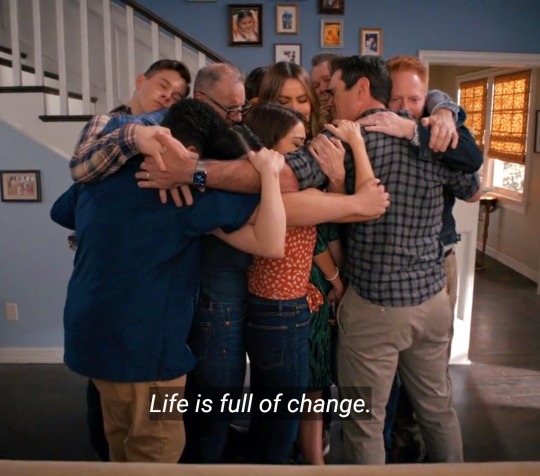
I have finished Modern Family. This series has been really fun and will hold a special place in my heart. I am watching this when I eat lunch or dinner as I am living alone and have no one to share a meal with. Thanks for letting me be part of this amazing and loving family! ❤️
#it's just dawning on me that I have finished another long series#i love long series because it becomes a constant part of my life#i will miss them#it has been fun#modern family#phil dunphy#claire dunphy#haley dunphy#alex dunphy#luke dunphy#cameron tucker#mitchell pritchett#lily tucker pritchett#jay pritchett#gloria pritchett#many delgado#joe pritchett#dylan marshall
75 notes
·
View notes